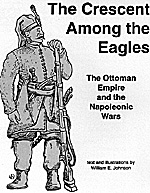
Title: The Crescent Among the Eagles: The Ottoman Empire and the Napoleonic Wars
Author/Illustrator:William E. Johnson
Pages: 103
Illustrations: 27 (most by the author; many uniforms and flags with detailed notes)
Maps: 2 (strategic)
Footnotes: None
Appendices: None
Bibliography: 21 sources, not differentiated as to primary or secondary, but with interesting notes about each reference work
Index: None (also noTable of Contents)
Publisher: Privately published by the author; distributed by G. F.Nafziger, P.O. Box 1522, West Chester, OH 450691522
Publication Date: 1994
Binding: Paper (spiralbound)
Price: $15.95 (plus $2.00 shipping & handling)
ISBN: (none)
Summary: A fascinating monograph about an overlooked empire and its influence on the major states of Europe during the Napoleonic period. This would be a much more useful reference guide if it had footnotes, an index, etc.
Mr. Johnson's preface in his book is the best summary of why his effort fills an important niche in a Napoleonic library.
"Most historical gamers are familiar with the big five of the Napoleonic Wars France, Great Britain, Russia, Prussia and Austria. Overlooked and forgotten is a sixth great power - the Ottoman Empire. During the Napoleonic Era, Ottoman forces fought almost continuously with or against France, Britain, Austria and Russia and their allies.
"In this period the Ottomans fielded larger armies and fought more major battles against European powers than Prussia. The massive Russian army was never free to participate decisively in European affairs for fear of the Ottomans. While most people believe Napoleon suffered his first defeat at the hands of the Austrians at Aspern Essling, in truth his first defeat was inflicted on him by an Ottoman army at Acre in 1799.
"The Oriental character of the Ottomans and the fact that they were already long past their prime by the time of Napoleon contributes partly to the disinterest by gamers in the Ottomans. But probably more important from a practical stand point is the almost total lack of information on the Ottomans of this period, a fault this booklet will, it is hoped, make a step toward correcting."
Although contemptuously referred to as "the sick man of Europe," Johnson contends that the Ottomans continuously frustrated their enemies because they refused to admit defeat, even after a disaster. Their ability to place another army in the field within weeks or even days of a defeat forced their enemies to take the Ottomans seriously on a strategic level, even if their armies could be easily out matched on a tactical level.
One of the most important ideas Johnson presents is that Russian General Mikhail Kutusov (Napoleon's opponent at Borodino) was able to negotiate a treaty with the Ottomans in April of 1812 that insured their neutrality during Napoleon's invasion of Russia. He feels that Napoleon's disregard for a potential ally, combined with Kutusov's skillful generalship and diplomacy, made it possible for nearly 200,000 Russian troops to be transferred to serve against the Grande Armee - a major factor in Napoleon's eventual defeat.
More Reviews
Back to Empire, Eagles, & Lions Table of Contents Vol. 2 No. 10
Back to EEL List of Issues
Back to MagWeb Master Magazine List
© Copyright 1995 by Emperor's Headquarters
This article appears in MagWeb (Magazine Web) on the Internet World Wide Web.
Other military history articles and gaming articles are available at http://www.magweb.com
